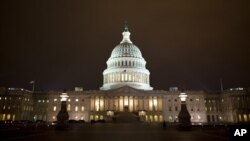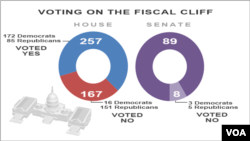Even as the White House and congressional Republicans crafted an early 2013 tax and spending deal in Washington, they set the stage for more rancorous debate in the coming weeks over financial issues they sidestepped.
Now, U.S. President Barack Obama and his political foes in Congress will soon face contentious financial decisions that have proven difficult to resolve in the last two years, foremost among them, whether to once again increase the country's borrowing limit. The country reached its current $16.4 trillion debt ceiling earlier this week and can keep paying its bills for about two months.
But by then it will need to again raise the borrowing limit, or face an unprecedented circumstance — running out of money and possibly defaulting on some of its bills, further imperiling its credit rating and the world economy. President Obama says he is willing to compromise on many government spending issues, but not on whether the debt ceiling should be increased.
"While I will negotiate on many things, I will not have another debate with this Congress over whether or not they should pay the bills that they have already racked up through the laws that they've passed," he said. "Let me repeat, we can't not pay bills that we've already incurred. If Congress refuses to give the U.S. government the ability to pay these bills on time, the consequences for the entire global economy would be catastrophic, far worse than the impact of a fiscal cliff."
A year and a half ago, congressional Republicans reluctantly agreed to the current debt cap, but only after forcing sharp government spending cuts that were set to take effect on New Year's Day. With the economic uncertainly in mid-2011, one financial services firm cut the U.S.'s long-held, top-ranked credit rating.
But instead of compromising in the last few days on what defense and domestic programs to trim, the White House and congressional Republicans postponed the spending curbs for two months. That will leave numerous decisions — such as how much to spend on popular Medicare health care and Social Security pension programs for older Americans — for about the same time as the debt ceiling dilemma.
As Congress approved higher tax rates for the wealthiest Americans, one lawmaker, Republican congressman David Dreier of California, said that containing the rising cost of providing the elder care benefits was essential to eventually cut the nation's debt.
"Entitlement reform is the only way that we are going to successfully get our arms around this massive ... 16-and-a-quarter-trillion-dollar national debt that is there," he said, referring to a financial problem that the president has frequently mentioned.
"I agree with Democrats and Republicans, the aging population and the rising cost of health care makes Medicare the biggest contributor to our deficit," said the president. "I believe we have got to find ways to reform that program without hurting seniors."
At the end of March, the White House and Congress also face one other financial issue — final budget decisions for the 12-month period that began last October. As last year's presidential and congressional elections loomed, the White House and Congress pushed off adoption of an annual plan and left spending at the same level as for the year that ended in September 2012.
Now, U.S. President Barack Obama and his political foes in Congress will soon face contentious financial decisions that have proven difficult to resolve in the last two years, foremost among them, whether to once again increase the country's borrowing limit. The country reached its current $16.4 trillion debt ceiling earlier this week and can keep paying its bills for about two months.
But by then it will need to again raise the borrowing limit, or face an unprecedented circumstance — running out of money and possibly defaulting on some of its bills, further imperiling its credit rating and the world economy. President Obama says he is willing to compromise on many government spending issues, but not on whether the debt ceiling should be increased.
"While I will negotiate on many things, I will not have another debate with this Congress over whether or not they should pay the bills that they have already racked up through the laws that they've passed," he said. "Let me repeat, we can't not pay bills that we've already incurred. If Congress refuses to give the U.S. government the ability to pay these bills on time, the consequences for the entire global economy would be catastrophic, far worse than the impact of a fiscal cliff."
A year and a half ago, congressional Republicans reluctantly agreed to the current debt cap, but only after forcing sharp government spending cuts that were set to take effect on New Year's Day. With the economic uncertainly in mid-2011, one financial services firm cut the U.S.'s long-held, top-ranked credit rating.
But instead of compromising in the last few days on what defense and domestic programs to trim, the White House and congressional Republicans postponed the spending curbs for two months. That will leave numerous decisions — such as how much to spend on popular Medicare health care and Social Security pension programs for older Americans — for about the same time as the debt ceiling dilemma.
As Congress approved higher tax rates for the wealthiest Americans, one lawmaker, Republican congressman David Dreier of California, said that containing the rising cost of providing the elder care benefits was essential to eventually cut the nation's debt.
"Entitlement reform is the only way that we are going to successfully get our arms around this massive ... 16-and-a-quarter-trillion-dollar national debt that is there," he said, referring to a financial problem that the president has frequently mentioned.
"I agree with Democrats and Republicans, the aging population and the rising cost of health care makes Medicare the biggest contributor to our deficit," said the president. "I believe we have got to find ways to reform that program without hurting seniors."
At the end of March, the White House and Congress also face one other financial issue — final budget decisions for the 12-month period that began last October. As last year's presidential and congressional elections loomed, the White House and Congress pushed off adoption of an annual plan and left spending at the same level as for the year that ended in September 2012.






